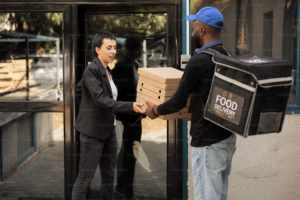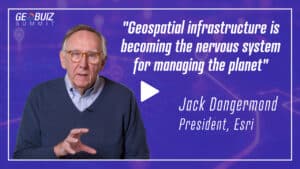GeoSmart India 2023, India’s premier geospatial technology conference kick-starts today at the Hyderabad International Convention Centre (HICC). With forward-looking theme Geospatial Infrastructure and Digital Twins: Powering National Economy, over the next three-days, the event will shed light across the cross-section of the cutting-edge frontiers of geospatial technology and its far-reaching impact on various industries.
There would be sessions and panels on key sectors such as agriculture, urban planning, land & property, mining & exploration, space and environmental conservation.
GeoSmart India envisions harnessing geospatial technologies and applications to tackle intricate challenges and spearhead progress across myriad sectors.
Importance of Geospatial Information
In his welcome address, Sanjay Kumar, Founder and CEO, Geospatial World said, “The geospatial industry is forecasted to reach $1 trillion but if you analyse its versatile sectoral uses and applications, it has already crossed the trillion dollar mark.
“World’s leading tech companies such as Google, NVIDIA and others are major users of location intelligence and spatial data. We are going through a global transition, post COVID. A lot of ecosystem are coming in together to build geospatial infrastructure. Digital twin and geospatial infrastructure will fuel the future growth”
In order to measure, monitor, model, and manage geospatial information is crucial. It is at the bottom of the full stack pyramid.
“Every output is dependent on productivity, efficiency, transparency, and compliance. All of our sustainability goals hinge on monitoring, transparency and compliance.” He added that in the past few years, there have been a lot of enabling space and geospatial policies, however now there is a need to go beyond policies towards comprehensive strategies.
Geospatial data as Enabler
Rajan Aiyer, Managing Director, Trimble India said, “GeoData is IT data on steroids, because IT is concerned with back office software, while geospatial has a very crucial field component – positioning. Geospatial data enables digital use-cases across industries, from agriculture to mining. Positioning is the fifth utility after water, fire, electricity, and internet. Continuously Operating Reference Stations (CORS) enables democratization of positioning. This is a true game-changer. It will accelerate adoption of geospatial infrastructure.
“Fifth Utility Enables creation of Digital Twins. Common Data Environment, or same source of truth, is the key to decision-making.”
“Even though digital twin is commonly used in the construction for centralizing the data between stakeholders across phases, bridging the gap between design and construction, and capturing digital assets for future use, there are applications across almost every other sector.”
He added, “We must create and manage geospatial data infrastructure responsibly, innovatively, and collaboratively.”
Need to Upskill
Agendra Kumar, Managing Director, Esri India said, “The national geospatial policy has focused not only on Digital Twins but also on fostering education amongst people for the technology. When you create geospatial infrastructure technologies in private entities, governments, it becomes a system of systems.”
He also spoke at length about the Indo ArcGIS that has streamlined the Indian Content with 800 layers of data put together.
Vishal Dhupar, Managing Director, NVIDIA India said, “We are standing at the cusp of fusion of three technologies: Artificial intelligence, intelligent content, and User Interface”.
He added that earlier computers were used to retrieve data but now we use it to digitize as well as generate data through generative AI technology.
G Ashok Kumar, Director General, National Mission for Clean Ganga (NMCG) spoke from a geospatial end-user perspective. He said, “We are the biggest users of GIS and geospatial technology in cleaning Ganga. We mapped the entire river, and identified all the entry points of pollutants to the river. Besides all the risks were identified and rectified. With the digital infrastructure and real time monitoring in place, we are able to take timely decision and clean the Ganga.”











